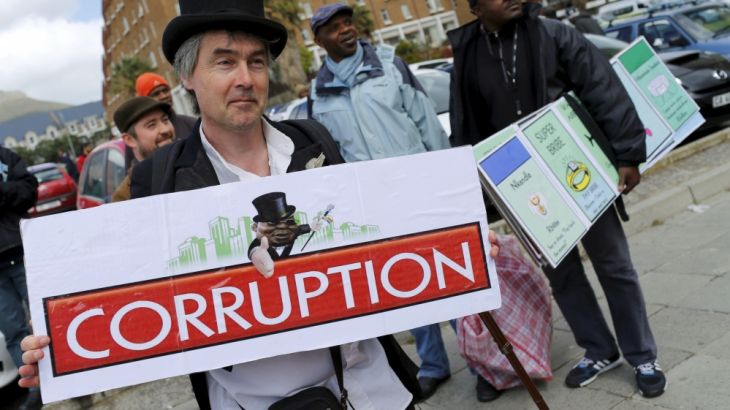
Too big to fail? The companies threatening South Africa’s economy
Will South Africa manage to bail out some of its biggest state-owned companies without crippling the economy?
South Africa has a problem. Some of its biggest state-owned companies pose a threat to the country’s economy due to their huge debts. Chief executives have resigned frustrated by red tape or have been fired because of corruption.
And President Cyril Ramaphosa, who recently won another term with the help of powerful unions, has shelved plans to fix problem companies.
Keep reading
list of 4 itemsOne of the biggest hurdles for athletes on the Olympic path: Money
Key takeaways from Xi Jinping’s Europe trip
When will EVs become mainstream in the US?
If the state was to step in to bail out two of the biggest firms, power company Eskom and ports operator Transnet, government debt would shoot up from 57 percent to 68 percent of the gross domestic product (GDP).
Eskom has said it does not need a third of its 48,000 employees but for unions and Ramaphosa that is a problem with South Africa’s unemployment rate at 27 percent.
With or without a bailout – power blackouts in March were behind South Africa’s economy contracting in the first three months of the year.
Eskom has been given an extra $4.9bn to keep operating and pay down some of its debts.
Transnet, which runs the country’s ports and rail freight, is also at the centre of numerous corruption allegations – from overpaying for locomotives to paying advisory fees for non-existent businesses.
South African Airways, which employs 5,700 people, is another company that has been without a chief executive for the last few months. In his resignation letter, CEO Vuyani Jarana complained his plans to turn around the loss-making airline were undermined by a lack of funding. He had requested $1.5bn.
There is little prospect of the government allowing the big state firms to fail as that would damage the economy. But right now, a high-profile commission is looking into alleged rampant state corruption presided over by former President Jacob Zuma.
So what is the state of South Africa’s economy and are these companies too big to fail?
“We’ve seen a massive build-up of financial stress at these state-owned enterprises [SOEs] … A lot of these SOEs are really right on the edge and requiring significant amounts of taxpayers’ support,” says Peter Attard Montalto, head of Capital Markets Research at South Africa-based Intellidex.
“Eskom is producing 90 percent of all the electricity in South Africa. It’s simply not an option not to having it fulfil that role. That is too big to fail and hence political, ideological games can be played around it. But none of the others I would say are too big to fail.”
From Paul McCartney to Taylor Swift, what’s behind the decades-old struggle by artists to control their work?
How do musicians make their money?
You may have thought after Taylor Swift’s spat with businessman Scooter Braun who bought the rights to Swift’s first six albums, that there was a link between streaming, publishing, record sales and her potential earnings.
Braun, the manager of Justin Bieber and Ariana Grande, paid $300mn for Big Machine Records, including the rights for the masters to Swift’s back catalogue.
Swift is not the first or last artist to have seen her work sold to the highest bidder.
Paul McCartney was not happy losing the rights to the Beatles’ catalogue to Michael Jackson. In 1985, Jackson paid $47mn to buy ATV, which included rights to music by Bruce Springsteen and the Rolling Stones.
McCartney is hoping to win the rights back.
Musicians still make most of their money from touring. According to Billboard, U2 was the top earner in 2018. The Dublin-based rockers made $54mn, nearly all of their earnings came from touring. Just $2.4m came from sales, streaming and publishing.
“It’s a conflict that is as old as the recorded music history … What we’ve witnessed with the Taylor Swift story is that conflict that occurs when an artist who has achieved huge global success, then comes to renegotiate with the label that actually prior to their fame had their rights signed off,” says Zach Fuller, Music analyst, Midia Research.
“In an era of digital, where a lot of artists are actually going direct to fan and bypassing the label system altogether, labels are having to play catch-up, effectively. So instead of offering a deal where you are taking a lot of the artist’s rights, the value proposition that they are offering is using their marketing strategies, their global networks, their ability to build a brand. And actually using that as their main selling point. So … it’s actually the middle class, or the independent artist that is outpacing the recorded industry’s overall growth … It’s label services that are winning at this point,” he explains.
According to Fuller, young musicians have “more choice than ever … When she (Taylor Swift) signed that deal, these opportunities didn’t exist. Those label services deals they were not in place and the whole streaming economy had not developed at this point.”